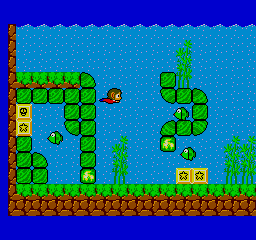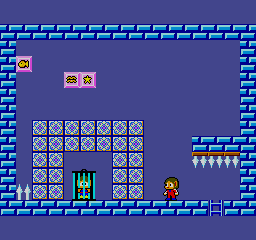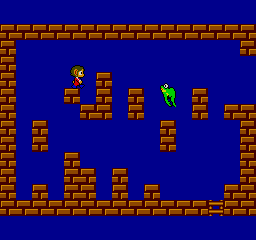


Alex Kidd in Miracle World
Sega Master System
Sega
1986
The Master System is an interesting console, as its reputation essentially lives and dies by one game (Phantasy Star). Ask anyone what the "second-best" SMS title is and prepare for awkward silence. The system's library -- though admittedly "fun" in its own way -- is littered with compromised ports, mediocre early Sega oddballs, and pure jank like Alex Kidd in Miracle World. This one falls into a very specific category: much like Zillion and Golden Axe Warrior it's trying (and failing) to successfully imitate an NES legend. Yes, Alex Kidd is the Mario of the SMS.
Protagonist Alex is some sort of elf, tasked with saving his brother from some bad dudes. This takes him on a journey across seventeen side-scrolling stages. Anyone who's unfamiliar with the game and has a cursory glance at footage is bound to be impressed. The graphics are quite beautiful for the time, taking full advantage of the SMS color palette (though the character models are admittedly ugly -- especially in regards to Alex and the bosses; at least Alex is properly represented on the box instead of being depicted as the fat freckled third-grader who tattled on you for saying "hell" out loud at recess...). Music is decent, if nothing extraordinary. There's a world map displayed between stages, quite the novel feature for '86, though Alex's journey has him bopping all around it, so it's of no use for gauging progress. There's even an inventory, currency, shops, and items that can be activated at any time. Wow! A couple of vehicles break up the walk/jump monotony as well: a motorcycle and a helicopter.


Also, the game excels right out the gate in terms of stage design. That first level is hugely impressive: a lengthy vertical drop that segues into an underwater segment complete with a musical change. But -- it's the best stage in the game. Really the only standout one. Speaking of the stage design, there's zero consistency here. You have long stages, tiny ones that just span a few screens, vehicle stages, and screen-by-screen mazey castles. And the brilliant vertical scrolling that starts the game with a bang: it's only seen once more, in the final stage, and just barely there. The game has no flow, no groove. Feels like the developers were experimenting (screwing around) a bit too much. Controls are terrible. The stuttery slippery ass jumps especially. It's not pronounced at first, but later stages have both low ceilings and tiny platforms, and it's nigh impossible to land some of the jumps correctly. Alex can't defeat enemies by jumping on them, and his punch attack is pitiful. Pacing is slowed by the slew of blocks that must be punched through to proceed, as collecting the contained currency is all but required.
Although ostensibly a straightforward platformer at first glance, the game decides to get nonlinear halfway through, with a missable item containing a "code" required to complete the game. Said code has not been sufficiently localized for Westerners, and entering it incorrectly during the concluding chapter leads to certain death. But all of this is petty poop compared to the ultimate, capricious, egregious sin: Alex Kidd can only be completed by defeating specific foes in games of rock-paper-scissors. That's right, these battles are completely random ("ackshually they're not random the enemies adhere to the same patterns every time and you can just memorize every single one!" -- okay but why would you?).
Intriguing enough from a historical perspective, Alex Kidd takes a fat dump in the gameplay department. For the morbidly curious retro archaeologist only.
Rating: 1.5/5
Reviewed: 07/01/25